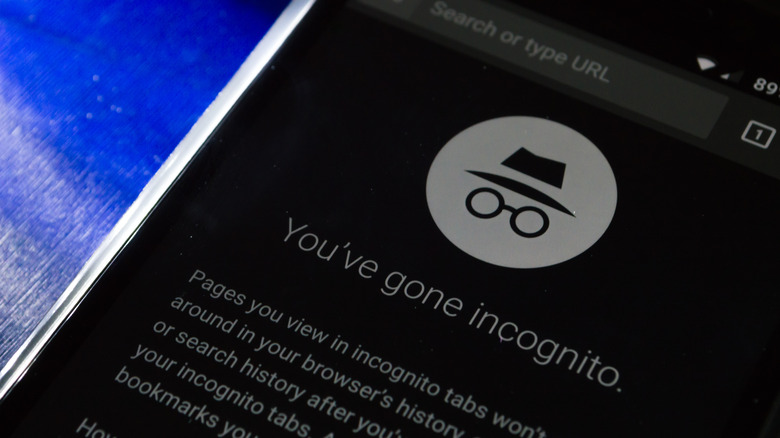The Big Myth About Incognito Browsing You Need To Stop Believing
Incognito browsing is offered on nearly every internet browsing platform out there. This mode is useful in many ways: your browsing history isn't saved, and neither are cookies or site data. This allows you to browse the internet without a trace. Well, to an extent. Although browsing history, cookies, and site data aren't saved to your device, this doesn't completely erase all evidence that you visited a site, as Google notes.
Although people using the same computer or other devices as you may not be able to look at your internet history after using incognito mode, the actual websites you visited can still see that you were there, and your ISP can view your browsing activity. This is because, although incognito mode hides your activity on your end, your IP address is still visible to websites you visit. Information you enter on websites, especially sites that you log in to, may save some info even if you're in incognito mode.
Why incognito mode doesn't hide you entirely
Your IP address is important information to those who are looking to track your activity. Incognito mode doesn't hide this information from websites you're visiting, so outsiders like your Internet Service Provider, the government, or users sharing an open network can still see your browsing activity. Also, any files you've downloaded or bookmarks you've saved while using incognito mode will still be visible in your browser.
Beyond that, your browsing history in incognito mode could still be discovered with some workarounds. This includes looking at your computer's DNS cache for Windows devices or using a third-party app on iOS or Android devices, as explained by Avast. So, incognito mode is really only good for some base-level coverage of your activity from other family members or roommates using your devices who aren't tech-savvy. Information about your device and activity will not be very well hidden from anyone who is serious about finding it out.
How to really keep your browsing activity safe
If incognito browsing doesn't keep you completely anonymous, what does? One option is to invest in a VPN, which stands for Virtual Private Network. These services will encrypt your information and hide your IP address while browsing the internet, making it much more difficult for anyone, including your ISP, to track your activity, as explained by Norton. However, you still need to be careful about what VPN service you use. Many free and some paid VPN services don't actually keep your information very safe and will log your activity.
Free VPN providers need to keep the lights on somehow, so they're much more apt to store and sell your data to advertisers. When choosing a VPN service, be sure to read their privacy policy and thoroughly look over the information on their site. If it's free, be extra careful. In many cases, using a free VPN would not comparatively make you more secure than just going incognito, though that ultimately depends on your end goal.


